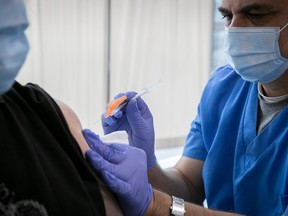Quebec authorities are also immunizing infants under six months of age with a promising antibody therapy against RSV.

And for the first time this year, medical staff will be immunizing infants up the age of 18 months against respiratory syncytial virus (RSV), a seasonal pathogen that often leads to overcrowded pediatric emergency rooms during the winter. Health Canada has approved a monoclonal antibody therapy, Nirsevimab, which is now being injected into premature infants in Quebec before they leave the hospital.
“This year, at least in pediatrics, we are hopeful that with Nirsevimab being offered, which is the monoclonal antibody against RSV, we are going to see a decrease in those types of emergency consultations and admissions,” Dr. Caroline Quach-Thanh, chair of the Quebec Immunization Committee, told a news conference in Montreal.
“So if the virus were to invade the nose or the lungs (of infants), the antibodies would come and coat the virus, so that it could not replicate and would prevent severe infections,” she explained.
Quach-Thanh added that RSV “was the virus that was overwhelming our services for the past few years,” and so Nirsevimab in theory relieve the pressure on our emergency rooms and on our hospitalization units.”
In September, Quebec launched an RSV vaccination campaign for Quebecers who are at least 60 years old and living in long-term care centres as well as those over the age of 75 living in private seniors’ residences. RSV vaccines have not been approved in Canada for younger age groups.
Meanwhile, hospitalizations with and for COVID-19 remain elevated in Quebec but appear to have plateaued, while the flu virus has yet to circulate in the community, noted Dr. Luc Boileau, chief public health officer. The province reported a total of 1,615 COVID hospitalizations as of Friday (the latest date on record), down from the 1,700-range at the end of September.
“The situation with COVID is, I would say, quite stabilized even though (activity) is still high and there is a high level of contagiousness inside the community,” Boileau said.
Canada has procured stocks of the latest mNRA vaccines by Pfizer and Moderna, and Quebec will be administering those shots. “It’s a KP2 vaccine, which is very close the KP.3.1.1 variant that’s circulating,” Quach-Thanh told The Gazette.
Quebec is launching the flu-COVID vaccination campaign nearly two weeks later than for the corresponding period last year, largely because of delays in approving and acquiring the Pfizer and Moderna shots. Priority is being given first to those in long-term care, as well as people who are suffering from chronic illnesses or who are immunocompromised, as well as pregnant women.
Boileau said authorities have set a goal of inoculating 80 per cent of long-term care residents against both COVID and the flu. In the community, the goal is more than 70 per cent for those who are at least 70 years old.
As for the epidemic of whooping cough, the province reported a cumulative total this year of 15,400 cases last week, with outbreaks continuing in Chaudière-Appalaches, Lac-Saint-Jean—Saguenay and Côte-Nord, although the rate of infections is declining.